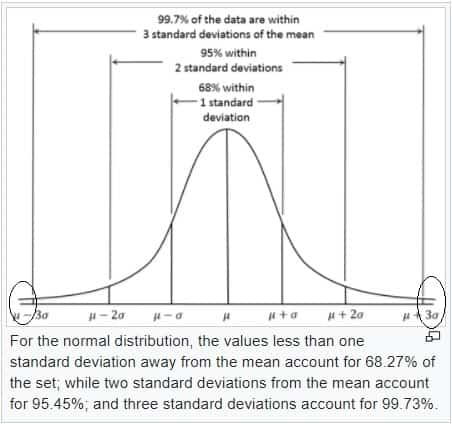In investing, there is a phenomenon known as 'tail risk'. This is best represented by the 'normal distribution' or 'bell' curve:

The likelihood of severe events occurring (either ridiculously good or ridiculously bad) at any one time falls within the black circles above, and is very low, around 0.1%. (There is also a phenomenon known as having 'fat tails', but that's for another article). Instead of the bell curve however, I like to think of these risks as being struck by lightning.
While unlikely, it's clearly possible and, from time to time, people do get struck by lightning. The company equivalent might be something like Insurance Australia Group Ltd (ASX: IAG) and QBE Insurance Group Ltd (ASX: QBE) having to pay claims for a monster storm. Both businesses are specifically designed to be able to withstand the claims from a 1 in 100-year storm. Yet if you invest for 100 years – and most of us these days will already be investing for 50-60 years or more, via superannuation – clearly you should expect that in at least one of those years, your insurer will take extremely severe losses.
Another example of tail risk might be something like the government completely outlawing junk food. While extremely unlikely, the negative impact of junk food is well known, and in fact the chance of negative regulation here is probably a lot higher than 0.1%. Unlikely though it may be, it would have a severe impact on the business of companies like Collins Foods Ltd (ASX: CKF; a KFC franchisor) and Domino's Pizza Enterprises Ltd. (ASX: DMP; the pizza franchisor).
When an investor buys shares they are agreeing to run certain risks, such as being struck by lightning. This, and other risks are why shares are much riskier than cash deposits or government bonds. Investors accept higher risks in return for higher rewards, just as they do when they choose to get out of bed in the morning.
Like in life, the key to investing is not being able to avoid these unpredictable 'lightning strikes', the key is being able to weather them when they arrive. I would bet on QBE's and IAG's chances of surviving a 1 in 100 year storm. The companies have no debt and billions in investments to support them, as well as long operating histories and the support of markets, which would allow them to raise additional capital.
By contrast, if junk food gets outlawed, Collins Foods Ltd and Domino's Pizza are probably going bankrupt due to their high debt load. Exceedingly unlikely, yes, but that's a risk you take as a shareholder.
With investing, the first priority is always 'reaching the finish line' and that requires considering the unlikely risks, as well as the likely ones.








